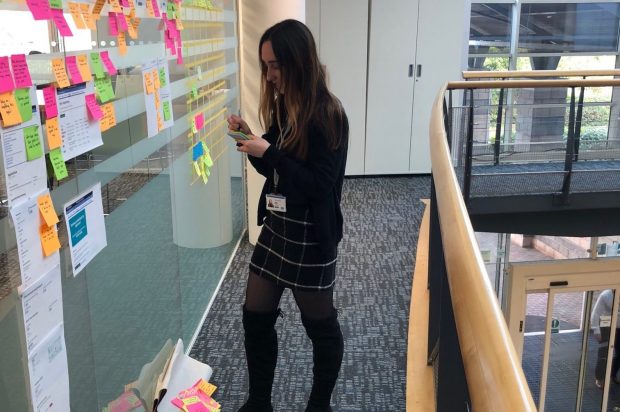Extremely proud to be a researcher in such a responsive service as ESFA

Lydia Carvill, junior user researcher at the ESFA, talks about her journey into user research:
I started working as a junior user researcher in the apprenticeship service in October after completing my degree in sociology and counselling skills in July 2018. What drew me to the role was the word ‘research’ as being a sociology studentI was very familiar with this.
My undergraduate dissertation included focus groups and interviews which gave me a brilliant taste of the research world. Before starting the application process, I researched user research (ironic I know) and the user research role, and the more I looked into it,the more I saw myself as being able to develop the skills of a researcher.
By October I found myself in the office meeting my colleagues and wearing sensible shoes. I quickly caught on to the fact that people used acronyms for everything and a lot of post-it notes.
The more people I talked to, and research sessions I sat in on, the more I understood how user-centred the service is. This week alone I have observed nine research sessions for different projects.
Since January 2016, the user researchers here have hosted around 7,000 sessions, which shows the value that the apprenticeship service places on user feedback.
Running sessions
What I have found most intriguing about the researchers is that they each take a different approach to running sessions, depending on which user the session is with and what topic they are researching.
Everyone who participates in the research sessions has agreed to give feedback on the service therefore they are eager and happy to participate. So whatever approach researchers use, their findings will always be useful because of the participants’ willingness to take time out to provide honest feedback.
As well as this, on numerous occasions I’ve heard participants praise the fact we hold these sessions and implement as much feedback as we can. This makes me extremely proud to be a researcher in such a responsive service.
Lessons learned
Other important lessons I have learnt from my journey into user research include:
- all feedback (good and bad) is positive feedback
- recruiting participants can be hard
- pop-up research is interesting and unpredictable
- some participants will know more about the subject than you
- sometimes users do not know what they want
I have discovered that being a user researcher crucially requires empathy. Discovering this amazed me as I’d spent time studying, practising and learning the value, and use of empathy, through the counselling side of my degree.
So, to have unwittingly selected a role which harnessed my knowledge of research and empathy was surprising and wonderful. A final lesson from this is that a significant word aligning with empathy is understanding, and I believe this to be the fundamental key to user research – to understand users.
Lydia Carvill, junior user researcher at the ESFA











Responses